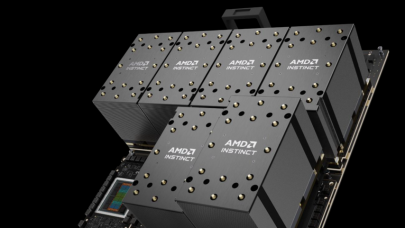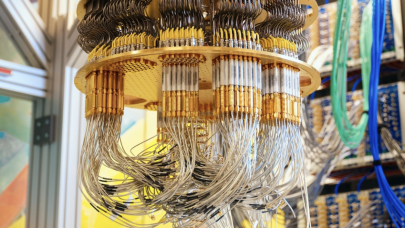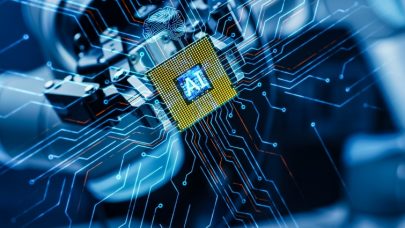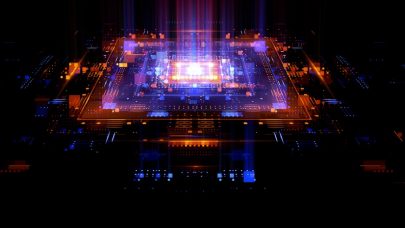LAS VEGAS, May 18, 2022 — Tachyum Inc. today announced two rack-based reference designs that deliver significantly more performance at dramatically lower power than the most powerful supercomputers available today, to better facilitate cloud, AI and supercomputing applications at unprecedented TCO savings.
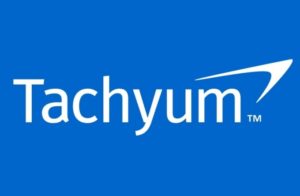 The Air-Cooled Prodigy Rack features 24 4P (4 processors) 2U servers and 96 Prodigy midrange chips to deliver up to 6.5 times the performance for HPC applications and up to 12.6 times the performance for AI applications with up to 16x higher performance/TCO than the NVIDIA H100 DGX POD featuring 4x H100 DGX and 32x H100 SMX.
The Air-Cooled Prodigy Rack features 24 4P (4 processors) 2U servers and 96 Prodigy midrange chips to deliver up to 6.5 times the performance for HPC applications and up to 12.6 times the performance for AI applications with up to 16x higher performance/TCO than the NVIDIA H100 DGX POD featuring 4x H100 DGX and 32x H100 SMX.
The Liquid-Cooled Prodigy Rack contains 36 4P (4 processors) 1U servers and 144 Prodigy top-end chips to extend performance for HPC applications to up to 13.5x and 27x for AI applications compared to the NVIDIA system. It also delivers up to 13x higher performance at more than 10x less TCO than the H100 SMX.
Tachyum’s Prodigy performance exceeds its conservative targets. As the detailed Prodigy design has matured, we have verified Prodigy’s much higher performance; significantly exceeding that which we originally projected. With its higher performance and performance per dollar and per watt, Tachyum’s Prodigy processor will enable Slovakia to procure the world’s fastest AI supercomputer. Delivering up to 128 exaflops of AI computing performance, this updated system will double its AI performance for the same 70 million EUR budget, enabling double the AI training and inference, at no additional cost. In addition, Slovakia will have the option to upgrade to 1 DP (Double Precision) Exaflops and 256 AI Exaflops within next year, for only 55 million EUR, which will give them a 1 DP Exaflops and 256 AI Exaflops supercomputer, for 125 million EUR, which is a fraction of the cost of any other solution.
Additional details about the Slovakian supercomputer proposal include:
- 128 exaflops AI performance
- 500 petaflops HPC double-precision performance
- 9 megawatts power consumption
- Over 1.6 petabytes of DRAM memory
- 100 petabytes of disk storage
The datacenter footprint of the Air-Cooled Prodigy Supercomputer is 107 racks of computer nodes and 10 racks of storage. The Liquid-Cooled Prodigy-based Supercomputer is 48 racks of computer nodes and 10 racks of storage. Future deployment of a modular supercomputer on the first generation Tachyum Prodigy platform is scalable up to 4 DP exaflop and 1 AI Zetaflop at less than 70 megawatts for only 500 million EUR.
The Prodigy-enabled Slovakian supercomputer would be in AI 7x more powerful than the NVIDIA Eos, which is anticipated to provide 18.4 exaflops, and over 25x more powerful than the Fugaku Supercomputer, which is currently the world’s fastest. Tachyum rack-based solutions offer comparatively more powerful performance than Tesla Dojo and the Cineca MARCONI100 computing systems, which are ranked among the largest and most powerful supercomputers today.
“Tachyum enables doing more with less, and with our air-cooled and liquid cooled rack solutions, we are doing exponentially more at even better TCO savings,” said Dr. Radoslav Danilak, founder and CEO of Tachyum. “Prodigy solves the problem of sustainable datacenter growth. It satisfies the need for more performance for less power. For the same price, we are doubling AI training and inference performance. And, with Prodigy, the world can save tons of carbon.”
Tachyum’s Prodigy processor can run HPC applications, convolutional AI, explainable AI, general AI, bio-AI, and spiking neural networks, plus normal data center workloads, on a single homogeneous processor platform, using existing standard programming models. Without Prodigy, hyperscale data centers must use a combination of disparate CPU, GPU and TPU hardware, for these different workloads, creating inefficiency, expense, and the complexity of separate supply and maintenance infrastructures. Using specific hardware dedicated to each type of workload (e.g. data center, AI, HPC), results in underutilization of hardware resources, and more challenging programming, support, and maintenance. Prodigy’s ability to seamlessly switch among these various workloads dramatically changes the competitive landscape and the economics of data centers.
About Tachyum
Tachyum is transforming AI, HPC, public and private cloud data center markets with its recently launched flagship product. Prodigy, the world’s first Universal Processor, unifies the functionality of a CPU, a GPU, and a TPU into a single processor that delivers industry-leading performance, cost, and power efficiency for both specialty and general-purpose computing. When Prodigy processors are provisioned in a hyperscale data center, they enable all AI, HPC, and general-purpose applications to run on one hardware infrastructure, saving companies billions of dollars per year. With data centers currently consuming over 4% of the planet’s electricity, predicted to be 10% by 2030, the ultra-low power Prodigy Universal Processor is critical to continue doubling worldwide data center capacity every four years. Tachyum, co-founded by Dr. Radoslav Danilak is building the world’s fastest AI supercomputer (128 AI exaflops) in the EU based on Prodigy processors. Tachyum has offices in the United States and Slovakia. For more information, visit https://www.tachyum.com.
Source: Tachyum
































